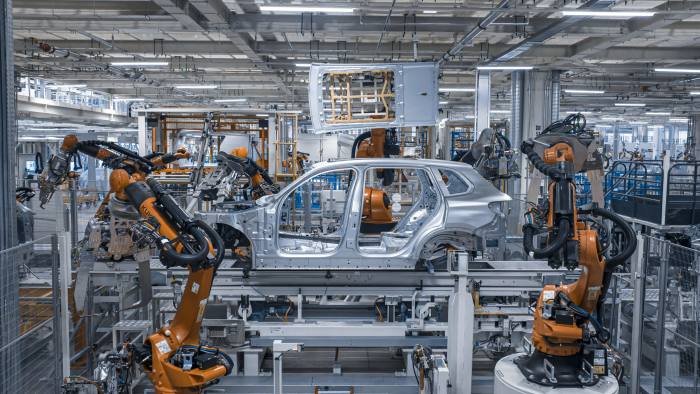[ad_1]
BMW Group and Audi have suspended shipments of cars by rail from Germany to China, the biggest market for both carmakers, due to the Ukraine war.
Most of the 846,237 vehicles BMW delivered to Chinese customers last year were produced at its joint venture factory in Shenyang, but between 150,000 and 200,000 were imported from Europe. Beginning in September, BMW began dispatching cars bound for western provinces by train, at a pace then set to reach 16,000 a year.
“Due to the current geopolitical situation, our train transport on the Silk Road and Trans-Siberian railway have temporarily been switched to alternative routes or transportation modes to ensure planning and supply security,” said BMW. “Vehicles for China and Mongolia are now transported by ship from Bremerhaven.”
Volkswagen Group’s Audi brand also confirmed that it has ceased rail shipments. Most of the 701,289 vehicles it delivered in China last year were also locally produced, but sales of imports rose 53 per cent.
Based on data from the Netherlands’ Nunner Logistics and shipping information service Drewry Supply Chain Advisors, the cost to send a shipping container to Shanghai on the usual rail route is now about 78 per cent higher than by sea freight. But the train route is usually several days shorter.

Officials in both China and Europe previously promoted the freight services as a geopolitical advance. In recent years, BMW and several of its peers began moving some shipments from ship to rail to lower their carbon footprint as well as to pursue higher speed and schedule reliability, particularly as Covid-19 disrupted port operations in many places.
These moves had helped to balance out the steady flow of Chinese imports on the trains. Last year, the Port of Duisburg, a small city in western Germany which is Europe’s top hub for Chinese train traffic, said it was dispatching one fully loaded eastbound train for each one arriving full from China; in 2017, the eastbound trains were just one-third full on average.

This article is from Nikkei Asia, a global publication with a uniquely Asian perspective on politics, the economy, business and international affairs. Our own correspondents and outside commentators from around the world share their views on Asia, while our Asia300 section provides in-depth coverage of 300 of the biggest and fastest-growing listed companies from 11 economies outside Japan.
It is unclear how many other exporters are following the lead of BMW and Audi.
Porsche told Nikkei Asia late last year that it was then sending two to three trains to China weekly, each with 82 cars, but did not respond to fresh queries. Computer maker HP, one of the first major multinationals to rely on the trains for westbound shipments, also did not respond to requests for comment.
According to the spokesperson for the Port of Duisburg, or Duisport, Europe-China service levels have remained unchanged at around 60 trains a week amid the Ukraine war even as companies’ eastbound bookings have fallen 20 per cent to 30 per cent.
“They probably worry about loss of cargo, confiscation and lack of insurance,” he said, referring to the risk Russian authorities could seize shipments in retaliation for sanctions and moves by many insurers to terminate coverage for freight sent through Russia. “Maybe it is also about taking a stand against Russia and Putin,” added the Duisport official.
Some European logistics companies are demanding that customers sign a liability waiver before accepting shipments for transit through Russia.
To keep traffic flowing, some local authorities in China have begun helping shippers with war insurance cover for freight heading to Europe from their jurisdictions. The operator handling routes from Shanghai has offered a 20 per cent discount on rates.
For shipments to Kazakhstan and other Central Asian republics, BMW is now using an alternate train route that runs through the Balkans, Turkey and the Caucasus. This itinerary requires at least one transfer by ship and the route can take almost twice as long as those through Russia. The Duisport official said the port has not observed much capacity expansion on the southern route.
A version of this article was first published by Nikkei Asia on April 26 2022. ©2022 Nikkei Inc. All rights reserved.
Related stories
[ad_2]
Source link

